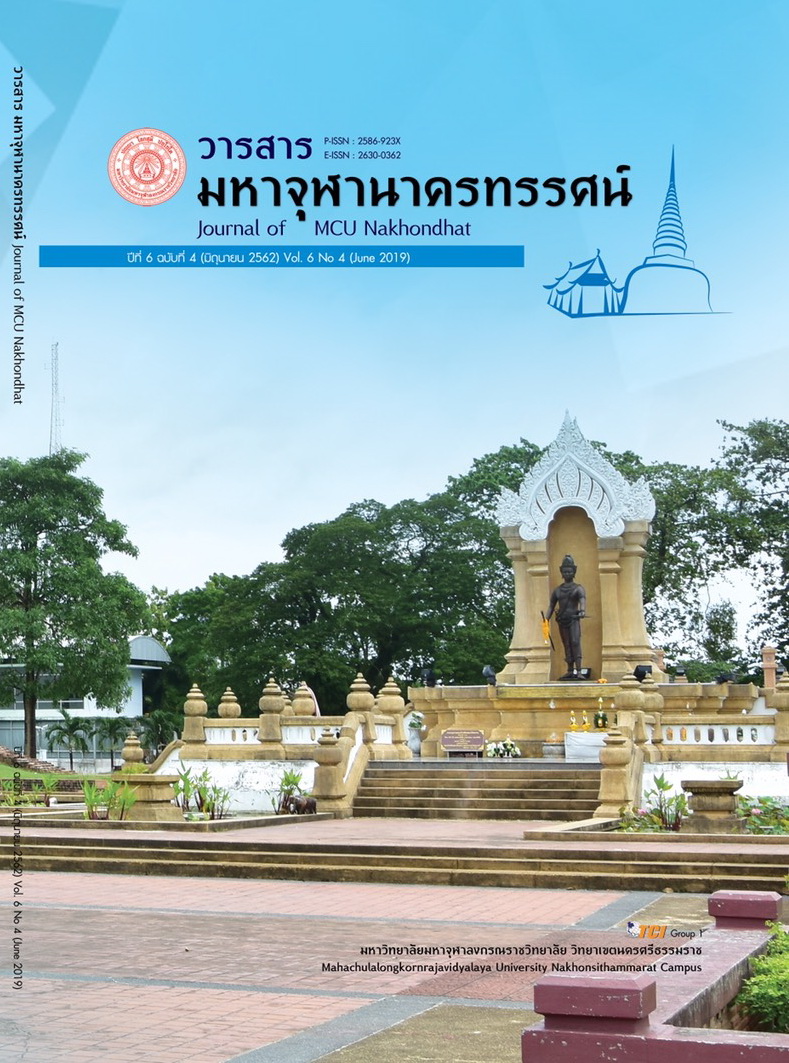THE SKILLS DEVELOPMENT MODEL BASED ON BUDDHA’S TEACHING METHODS FOR TEACHER MONKS IN SCHOOLS UNDER PRIMARY EDUCATION SERVICE AREA OFFICE
Main Article Content
Abstract
Abstract
The objectives of this research were; 1) to study the state of teaching skills of the morality teaching monks, 2) To develop the model of teaching skills development of the morality teaching monks in accordance with Buddhist teaching methods, 3) to propose a model for the development of teaching skills of the morality teaching monks in accordance with Buddhist teaching methods in educational institutions under the Office of Primary Education Area. The methodology of research is a mixed method, including quantitative research by using a sample of 248 persons, using percentage, mean, standard deviation and qualitative research by interviewing 10 qualified persons, discussing 10 qualified groups of persons.
The research found that:
- the state of teaching skills of the morality teaching monks in the school under the Office of Primary Educational Service in West Area, The research found that the overall of the morality teaching monks has a high level of opinion, sorted by average from descending order, i.e., the state of the skills in using verbal gestures in teaching, state of the skills described in teaching, the state of the skills in summarizing lessons in teaching, the state of the skills into the lesson, The state of the skills of using teaching equipment, The state of the skills for using blackboard skills in teaching, The state of the skills in using questions in teaching, The state of the skills of encouragement in teaching and the state of the skills of stimulating interest in teaching, respectively.
- Develop a model for the development of teaching of the morality teaching monks in accordance with Buddhist teaching methods in educational institutions under the Office of Primary Education Service Area in 4 issues, namely 1) Developing teaching skills with conversation, 2) Developing teaching skills with lectures 3) Developing teaching skills by answering problems, and 4) Developing skills for teaching by placing rules.
- The model of teaching skills development of the morality teaching monks according to Buddhist teaching methods in educational institutions under the Office of Primary Education Area, consisting of 4 parts, namely, Part 1 : the leading parts are 1) Environment 2) Principles 3) Objectives, Part 2 : The model consists of 1) work system 2) management process, Part 3: Implementation steps include 1) Structure 2) Decision, Part 4: Success conditions, The results of the examination of the model in the overalls are at a high level. When considered in each aspect from descending, found that the accuracy, usefulness, appropriateness and feasibility by integrating with the Buddhist Teaching methods in four aspects, namely conversation, lecture, answer, problem and regulation.
Article Details
References
พระครูเกษมสุทธิคุณ (สนฺตจิตฺโต). (2557). พุทธวิธีการสอนเชิงบูรณาการให้ผู้เรียนมีส่วนร่วม. วารสารครุศาสตร์ปริทรรศน์ คณะครุศาสตร์ มหาวิทยาลัยมหาจุฬาลงกรณราชวิทยาลัย, 1(2), 160-169.
พระครูบวรชัยวัฒน์ และคณะ. (2562). ความพึงพอใจของนักเรียนที่มีต่อคุณลักษณะครูพระสอนศีลธรรมในโรงเรียน มหาวิทยาลัยมหามกุฏราชวิทยาลัย วิทยาเขตศรีธรรมาโศกราช จังหวัดนครศรีธรรมราช. วารสารมหาจุฬานาครทรรศน์, 6(2), 1022-1033.
พระมหาวิไลศักดิ์ หงษ์ศรี และคณะ. (2558). รูปแบบการเรียนการสอนศีลธรรมที่เหมาะสมของครูพระสอนศีลธรรมในโรงเรียน. วารสารวิทยาศาสตร์และเทคโนโลยี มหาวิทยาลัยราชภัฏสกลนคร, 7(2), 25-32.
พระสมจิตต์ ขนฺติธมฺโม. (2553). ความพึงพอใจของนักเรียนที่มีต่อคุณลักษณะที่ดีของครูพระสอนศีลธรรมในโรงเรียนวัดโบสถ์ อำเภอเมือง จังหวัดนครศรีธรรมราช. ใน วิทยานิพนธ์ศาสนศาสตรมหาบัณฑิต สาขาพุทธศาสน์ศึกษา. มหาวิทยาลัยมหามกุฏราชวิทยาลัย.
สวัสดิ์ เพชรบูรณ์. (2550). การพัฒนาการบริหารจัดการโรงเรียนวิถีพุทธระดับมัธยมศึกษาตอนต้น โรงเรียนวัดสังเวช สังกัดสำนักงานเขตพื้นที่การศึกษากรุงเทพมหานคร เขต 1. ใน ดุษฎีนิพนธ์ศึกษาศาสตรดุษฎีบัณฑิต สาขาวิชาหลักสูตรและการสอน. มหาวิทยาลัยเกษตรศาสตร์.
สำนักพระสอนศีลธรรมในโรงเรียน. (2561). ความเป็นมาของโครงการพระสอนศีลธรรมในโรงเรียน. เรียกใช้เมื่อ 20 มกราคม 2561 จาก https://www.krupra.net/new/index.php?url=krupra


